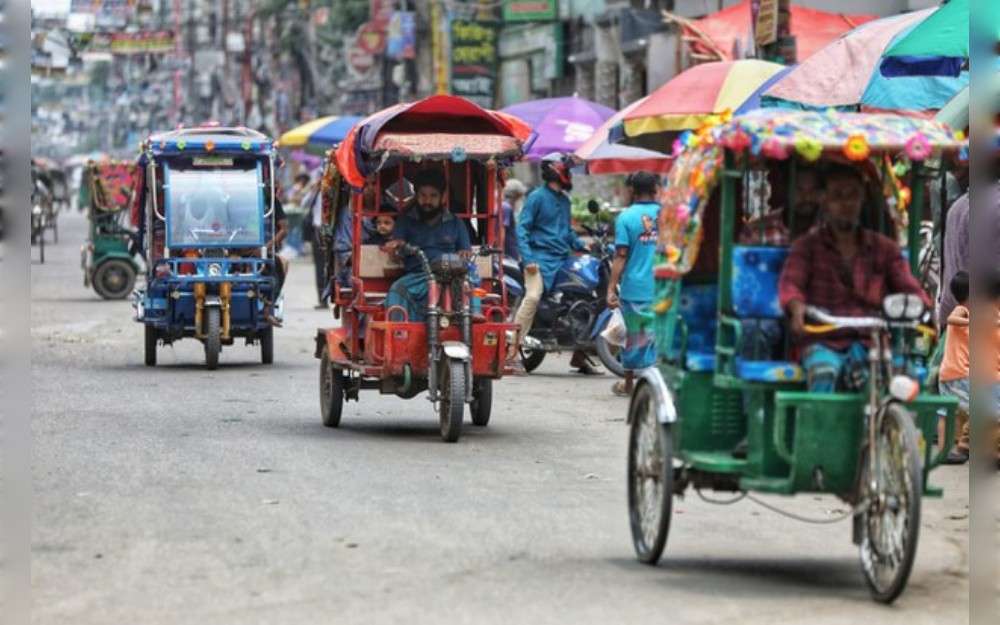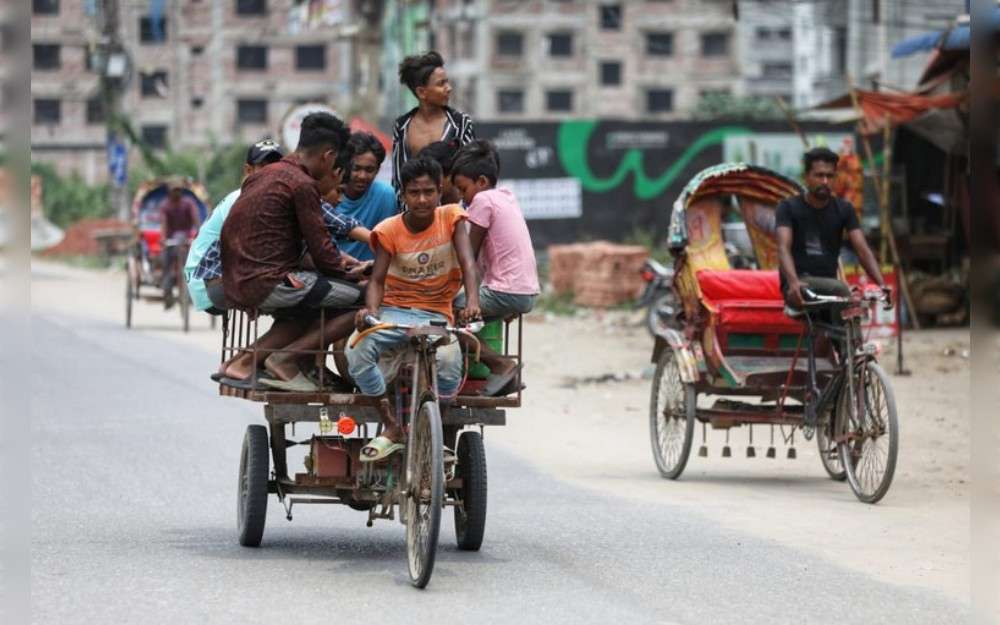About 4 million of these vehicles operate throughout the nation without proper permits.
Kamran Reza Chowdhury/Dhaka

Police launched a crackdown to remove thousands of batterpy-powered three-wheel vehicles from the streets of Dhaka after Bangladesh’s transport minister this week announced a ban because of road safety and environmental concerns.
About 4 million of the three-wheelers – commonly known as Easy Bike, Tomtom and Autorickshaw – have been operating across the country with no regulation, according to officials. For commuters, these vehicles are a cheap way to travel while critics said they are a menace on the roadways and a major source of lead pollution.
“We have already started operations against the illegal battery-run three-wheelers and will not allow them to ply Dhaka streets and lanes. These are unregistered, unauthorized,” Md. Jahangir Alam, additional deputy commissioner (traffic) at the police headquarters, told BenarNews.
The crackdown, which began Thursday, does not apply to similar but more stable vehicles powered by compressed natural gas.
Dhaka residents expressed mixed reactions to the news.
“These are unpredictable – suddenly they run at high speed, racing with bikes and motorized vehicles. Very often, the drivers take busy highways even in the opposite direction. These are very risky,” Md. Sumon, a biker and resident of Dhaka’s Sher-e-Bangla Nagar neighborhood, told BenarNews.
Another resident said the price was right for many travelers.
“People use it because it is cheaper and easily available. A manually driven rickshaw charge is almost double that of a battery-run Easy Bike charge,” Azizur Rahman told BenarNews. “Therefore, you will hardly find any manually driven rickshaw outside Dhaka.”
Still, he called on the government to establish a comprehensive plan to phase out the vehicles throughout Bangladesh.
Abdur Rashid, who lives in Dhaka’s Pallabi neighborhood and drives an Easy Bike to support his family, said the ban could hurt him.
“I have driven today but I am worried I may not be allowed to go to the streets from tomorrow. If it happens, how will I manage my family expenditures?” he told BenarNews on Thursday, adding, “Innumerable number of people will be out of work.”
“If these are not allowed to operate, crimes such as muggings and burglaries will increase across the country because the lives of millions of people are directly linked with the Easy Bikes and Autorickshaws,” he said.

China began exporting the three-wheelers to Bangladesh in 2006 and 2007, but the Bangladesh Road Transport Authority did not issue permits because the vehicles were considered unstable, according to Sitangshu Shekhar Biswas, a director of engineering at BRTA.
Even without permits, importers continued to market the vehicles throughout Bangladesh, often with permission from local governments, he said.
“These battery-run vehicles are responsible for at least 15% of the total road accidents, and the number of fatalities is on the increase,” Biswas said.
Despite those concerns, Nasrul Hamid, the state minister for power, termed the vehicles the “Tesla of Bangladesh,” when speaking to MPs in February about the millions of battery-powered vehicles across the nation. Hamid was responding to a question from Awami League MP Shamim Osman, who called for a ban on them over safety concerns.
Health concerns
Humayun Rashid Khalifa, a consultant and former BRTA director, pointed to the vehicles’ batteries as a reason to get them off the road.
“Not only in Dhaka, the battery-run three-wheelers should be banned across the country. Every single day these vehicles have been adding thousands of tons of hazardous lead to the environment,” Khalifa told BenarNews.
“Each vehicle adds at least 3,000 kg [6,600 pounds] of hazardous lead in a 10-year life cycle,” he said.
Khalifa said each of the three-wheelers has been fitted with four to five batteries housing 150 kg (330 pounds) of lead.
“After every six to nine months, the whole set of batteries must be replaced with a new one. These expired batteries are not fully recyclable,” Khalifa said, explaining the 10-year figure.
“These three wheelers have at least three demerits – higher rate of road fatalities, huge environmental consequences caused by lead pollution and theft of electricity used for charging batteries,” Khalifa said.
Mahbubur Rahman, a researcher with ICDDR,B, a health research organization in Dhaka, carried out a study on lead pollution in Bangladesh.
“The battery-run rickshaws, silently, have been causing unimaginable damage to the environment and human health. Nobody cares about it. People are using these because they are cheaper, but the consequences are disastrous,” he told BenarNews.
Rahman said the lead could not be destroyed.
“A section of people employs children and poor people to break the used batteries to extract lead. They wash the used-lead with water which ultimately ends up in rivers and canals, contaminating water and soil,” he said.
“When the lead-laced contaminated water is used in farming, lead reaches the human body, cattle, birds and trees. By eating the fish from contaminated waters, the lead is transmitted into our body through the food chain,” Rahman said.
He said he examined the blood samples of the people living in houses up to two km (1.2 miles) from some battery recycle facilities in Mirzapur in Tangail and Dhaka’s Savar neighborhood.
“The blood sample of a child contained 46 micrograms per deciliter against the maximum permissible reference value of 3.5 micrograms per deciliter. Not only the child, the people living near the facility have more lead in their blood samples,” Rahman said.
“Lead pollution has several serious health impacts, it causes neurological disorders, especially among the children. Now, imagine what damage the battery-run three-wheelers are causing to our country,” he said.
Copyright ©2015-2022, BenarNews. Used with the permission of BenarNews.













